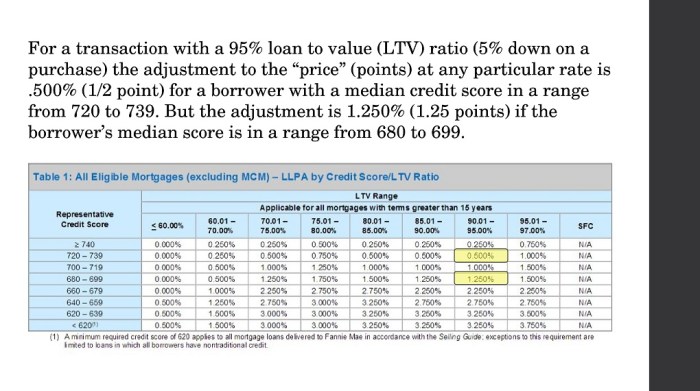When it comes to applying for loans, credit scores play a crucial role in determining approval and terms. Dive into the world of credit scores and loans as we explore how this three-digit number can have a significant impact on your financial opportunities.
From influencing loan approval processes to determining interest rates, credit scores have the power to shape your borrowing experience in more ways than you might imagine.
Importance of Credit Scores
Having a good credit score is crucial when applying for loans as it reflects your financial responsibility and trustworthiness to lenders. A higher credit score can increase your chances of loan approval and help you secure better loan terms and interest rates.
Credit Scores Impact on Loan Approval
Your credit score plays a significant role in the loan approval process. Lenders use your credit score to assess the risk of lending you money. A higher credit score indicates that you are more likely to repay the loan on time, making you a lower risk borrower. On the other hand, a lower credit score may lead to rejection of your loan application or approval with less favorable terms.
Credit Scores Influence on Loan Terms and Interest Rates
Lenders often offer lower interest rates and better loan terms to borrowers with higher credit scores. This is because borrowers with good credit scores are considered less risky, and lenders are more confident in their ability to repay the loan. On the contrary, borrowers with lower credit scores may face higher interest rates and less favorable loan terms due to the perceived higher risk associated with lending to them.
Factors Affecting Credit Scores

When it comes to credit scores, there are several key factors that play a significant role in determining whether your score is good or bad. Factors such as payment history, credit utilization, and credit history can greatly influence your credit score.
Payment History
Your payment history is one of the most crucial factors that impact your credit score. Making timely payments on your bills and loans shows lenders that you are responsible and can be trusted to repay your debts. On the other hand, late payments or defaults can significantly lower your credit score and signal to lenders that you may be a risky borrower.
Credit Utilization
Credit utilization refers to the amount of credit you are using compared to the total amount of credit available to you. Keeping your credit utilization low, ideally below 30%, can positively impact your credit score. High credit utilization can indicate that you are relying too heavily on credit and may have trouble repaying your debts.
Credit History
Your credit history, which includes the length of time you’ve had credit accounts and the types of credit you have, also plays a role in determining your credit score. A longer credit history with a mix of different types of credit, such as credit cards, loans, and mortgages, can demonstrate to lenders that you have experience managing credit responsibly.
Impact of Late Payments, Defaults, and Bankruptcies
Late payments, defaults, and bankruptcies can have a serious negative impact on your credit score. These negative marks on your credit report can stay on your record for several years and make it difficult to qualify for loans or credit cards in the future. It’s important to avoid these financial pitfalls to maintain a healthy credit score and financial stability.
Relationship Between Credit Scores and Loan Approval
When it comes to getting approved for a loan, your credit score plays a crucial role in determining your eligibility. Lenders use your credit score as a measure of your creditworthiness, which helps them assess the risk of lending you money.
Credit Scores and Approval Rates
- Individuals with high credit scores are more likely to get approved for loans compared to those with low credit scores. A high credit score indicates to lenders that you are responsible with managing your finances and are more likely to repay the loan on time.
- On the other hand, individuals with low credit scores may face challenges in getting approved for loans as lenders perceive them as higher risk borrowers. They may either be denied a loan or offered one with less favorable terms, such as higher interest rates or stricter repayment terms.
Credit Scores and Types of Loans
- High credit scores open the door to a wider range of loan options, including lower interest rates and better terms. Individuals with excellent credit scores may qualify for mortgages, car loans, and personal loans with competitive rates.
- Conversely, individuals with poor credit scores may be limited to high-interest loans or secured loans that require collateral. They may also have difficulty qualifying for large loan amounts or favorable terms.
Impact of Credit Scores on Loan Terms
When it comes to borrowing money, your credit score plays a crucial role in determining the terms of your loan. Lenders use your credit score to assess your creditworthiness and decide the interest rates and repayment periods they offer you.
Credit Scores and Risk-Based Pricing
Risk-based pricing is a strategy used by lenders to assess the risk of lending money to a borrower. Lenders analyze your credit score to determine the level of risk you pose as a borrower. The lower your credit score, the higher the risk you are considered, leading to higher interest rates on loans.
- Lenders may offer borrowers with high credit scores lower interest rates as they are viewed as less risky.
- On the other hand, borrowers with low credit scores may face higher interest rates due to the perceived higher risk associated with lending to them.
Examples of Impact on Interest Rates
A borrower with a credit score of 750 may be offered an interest rate of 3% on a loan, while a borrower with a credit score of 600 might be offered a rate of 7% for the same loan amount.
